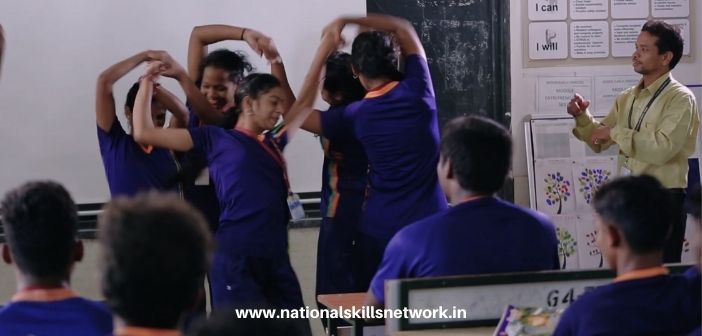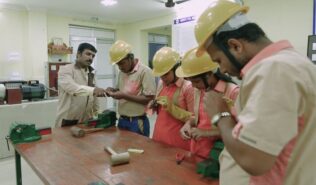Multi-stakeholder partnerships and strategic collaborations form an integral part of skill development initiatives in India. However, in such partnerships, sustainability and effectiveness of the programme have remained a matter of concern. Can the government and the private sector engage in long-term partnership to build sustainable skilling models that can be replicated across India? To answer this question, let’s look at an example from the Tata STRIVE-Bagchi Life Skills Programme being offered in government ITIs in Odisha.
In 2017, the programme started in ITIs in 10 districts that resulted in training 6300 students in the first year and then it was extended to 10 more ITIs with an aim to train 12000 students in next two years. This collaboration with Odisha Skill Development Authority (OSDA) is intended improve the employability of the students by deploying trained Tata STRIVE faculty, who use Inquiry Based and Project Based learning techniques. In addition, modules such as quality, design thinking safety, sustainability mind set add to the NCVT curriculum.
Initially, the programme was financially supported by various foundations, HNIs and corporates while Tata STRIVE and OSDA jointly worked on creating an environment of ‘acceptance of change’ in fact the Tata STRIVE faculty were called ‘Change Leaders. Gradually, the programme has shaped up as a self-sustainable project that can be scaled across the state with government funding and support and withstand the test of time. It’s the journey from experimentation to proof of concept to adoption supported by appropriate funding models marks milestones in achieving sustainability.
“You cannot build a sustainable skill development programme on day-one; sustainability gets built over a long period and it’s a journey. In the case of OSDA, we have built an ecosystem that can support even after Tata STRIVE moves out. Our role as a catalyst has demonstrated how sustainability, quality and scalability are significant aspects of any impactful skilling intervention”, says Anita Rajan, CEO, Tata STRIVE.
What is outstanding in this case is how the immersive elements of the program and its consistent results have enhanced confidence and conviction in the government.
The government’s readiness to fund the programme is the direct result of its rich experience, combined with the efficiency of the model in being expanded to more ITIs and delivering consistently in terms of quality. This also shows how scalability was built into the system, laterally.

Being sustainable, by definition, means the ability or capacity of something to be maintained or to sustain itself, it should continue forever, with endurance of systems and processes. This can be achieved only through multi-stakeholder engagement where the skill development and vocational training institutions, the government and the industry come together to design and build sustainable programs. And, it would be based on models that are replicable, adaptable, inclusive and sustainable.
“The criteria to be followed for scaling any skill development program are, it should be replicable, relevant, standardized, transferable, localized”, further elaborates Ms. Rajan.
Ensuring sustainability, financial stability and quality
Sustainability in skill development in India can be interpreted in multiple ways. It must also enable sustainable livelihoods for the youth, in addition to delivering quality, having scalability built-in and of course, the economic and social nuances that always and must always accompany efforts towards ensuring sustainability.
Financial stability is one of the primary aspects when it comes to attaining sustainability in skill development which is presently highly dependent on CSR funds. While we need new financial models to demonstrate that a course or a programme is of value to various stakeholders, gradually, the courses should become self-sustainable without any external financial support.
This is necessary as the past experience shows many training centres were shutting down for being completely dependent on CSR funds and the impact of Covid-19. Financial dependency will also restrict the expansion of the programs to different locations or adopt technology to offer the courses in blended models.

Along with funding, ecosystem changes in technology-enabled vocational education and skill development are the need of the hour. Technology holds a critical place in terms of scale and quality. “It is the standardization that comes with technology in enrolment, mobilization, counselling, and more. This can be replicated and this enables scale”, says Ameya Vanjari, Head, Technology and Innovation, Tata STRIVE. Moreover, “both government and the private sector, i.e., the industry have to go hand in hand to improve and strengthen the ecosystem”, adds Ameya.
Ensuring quality in skill development programs and training is crucial in creating sustainable models. Quality does not just mean the kind of courses that are offered, but the standardisation of the methodology, the curriculum and the outcomes, are some of the points that need to be addressed. “The path we have taken is far deeper than interventions in quality to govern and manage the programme. For instance, how do you engage youth whose level of confidence is low and how do we get dropouts back into the habit of learning?”, says Ameya.
Also, quality has a direct impact on student retention and controlling attrition. Bhaskar Natarajan, Head, Programme Execution, Tata STRIVE emphasizes this aspect when says, “sustainability of quality is when students are able to find a job and stay on for considerable period after skills training.” Talking about how parents perceive quality in skill development, Bhaskar adds, “parents who influence students career choices prefer big brands as they it makes them feel secure about their future”.
The trainers, who actually execute various programs, need a focused orientation in maintaining quality in everything they do. Sudhakar Gudipati, Head, Programme Development and Partnerships, Tata STRIVE, puts forward “efforts or investments are being made in developing infrastructure but not so much into faculty development. But we must not forget that the good trainers will automatically impact the overall quality of the program and skills delivery.”
Read more from Tata STRIVE here – https://nationalskillsnetwork.in/tata-strive/
The Tata STRIVE – OSDA project clearly demonstrates how sustainability, scalability and quality are the three pillars of any successful partnership. It takes time and concerted effort to build various elements that make the programme stand on its own, right from generating funds to ensuring that the program is executed efficiently. For many training organizations and governments that are keen on exploring partnerships to build stable models, the Tata STRIVE model shows how sustainable skill development really works.














Comments 2